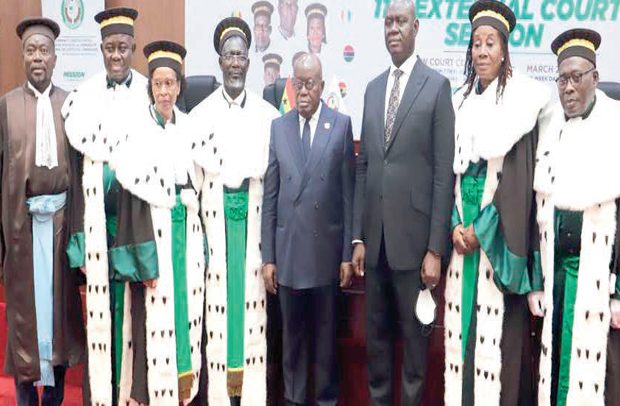President Akufo-Addo and the Justices of the ECOWAS Court
The 11th edition of the Economic Community of West African States (ECOWAS) Community Court of Justice’s External Court Session opened in Accra yesterday with a call on member states to put in place measures to ensure the enforcement of the rulings and judgments of the court.
The President of the ECOWAS Court, Justice Edward Amoako Asante, speaking at the opening ceremony, bemoaned the lack of implementation of the court’s decision, which he indicated currently stands at only 30 per cent among member states.
“We have challenges regarding the enforcement of the judgment of the court by the national courts, arising mainly from the fact that member states are yet to domesticate the ECOWAS Revised Treaty and Protocols on the Court. The lack of implementing legislation that will empower national courts to recognise and enforce the judgments of our court is also a militating factor. Currently, member states comply with our judgments at will and at their convenience. This places the enforcement rate of our judgments at thirty per cent, which is very sad,” Justice Asante lamented.
The court’s sitting, which is happening in Ghana for the first time, is aimed at bringing justice to the common man at the community’s grassroots, especially the indigent citizens who could otherwise not afford the cost and logistics of travelling to the seat of the court in Abuja to access justice.
Justice Asante noted that Ghana was selected in recognition of the leading role it is playing in the integration process of ECOWAS “and our desire to deepen collaboration between our court and the national courts of the Republic of Ghana.”
Ghana’s Chief Justice, Justice Anin Yeboah, in a speech observed that despite the differences in the mandates of Ghanaian courts and the ECOWAS court, there is room for collaboration in the execution of those mandates.
He said the Protocol on the ECOWAS Court of Justice gives the national courts of member states the responsibility for enforcement of the judgments of the courts, and therefore, called on Ghana to domesticate the ECOWAS Revised Treaty on the courts and also enact implementing legislation to enable the national courts of Ghana to recognise and enforce the judgment of the court.
He added that the court’s sitting in Accra will offer members of the Ghanaian Bar the opportunity to observe an international court in session and learn more about the practice and procedure of the ECOWAS Court.
The court will be sitting for eleven days and will within the period hear 60 cases and deliver 25 judgments.
BY Gibril Abdul Razak

